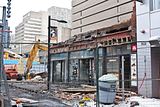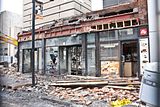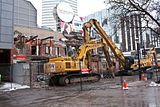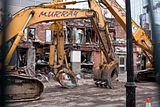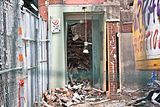... but in a context like that of Montreal the heritage crusade amounts to a skirmish rather than a full-on war as it is in Toronto. Little wonder les habitants are lining up to join the cause, now matter how much matters of patrie and patrimoine are valued in a more general sense. As you say, what's one more church or industrial loft, more or less?
I'm kind of confused re what you're saying, unless you garbled a message--are the "
les habitants" the "average Quebecers" I'm speaking of? Are you saying they *would* rally, or *wouldn't* rally?
Unless you're trying to send a message along the lines that Montreal can "absorb its" losses better than Toronto can--
which is, really, a totally bass-ackward way of approaching the issue. Look:
a loss is a loss. Period. Toronto has Salad King; Montreal has Ben's. Toronto has the Riverdale half-round; Chicago has Michael Reese Hospital. And for all Chicago's professed "architectural town-ness", I highly doubt that "average Chicagoans", so wo speak, would have rallied for Michael Reese Hospital. Yet, that didn't make it any less valid as a preservation crusade (however failed) du jour.
Put it this way: inherently, I don't feel Torontonians are so heritage-ignorant as you seem to feel. Where the critical ignorance *does* lie is regarding heritage *regulation*--and it's a perfectly natural ignorance: you don't expect average folk to understand bureaucratese. In this case, I feel the building was taken for granted--but not in the disposable/dispensable sense; rather, I think that for very, very many,
it was taken for granted *as* casually-presumed heritage. The architecture, and the building's survival (however precarious), spoke for itself, regardless of whether one knew of its history and/or provenance and/or level of heritage protection, or lack thereof (and w/Salad King lately adding a tantric gastronomic twist to it all).
Don't be too rough on Torontonians--in fact, we may be paradoxically better off for a state of "full-out war", or maybe should we say "full-out catharsis". Perhaps it's the Jane Jacobs thing, but Toronto does urban catharsis well. The Duke's fire proved it; the G20 proved it; this present fire proved it.
Maybe in the end, the problem isn't that Toronto is hostile to heritage; rather, it's that the existing standards, parameters, common communicated knowledge etc are flabby, ad hoc and formless--which leads to lacunae after misunderstanding after confusion after calamity after whatever...
